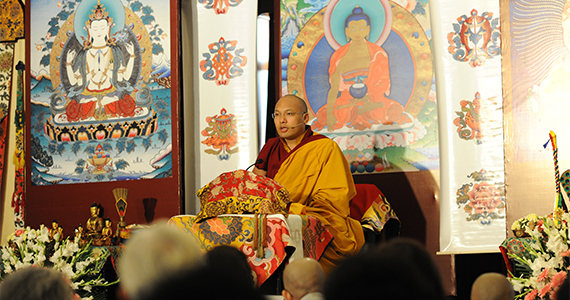1-2 November 2013 – Habitat Centre, New Delhi
At the invitation of the Foundation for Universal Responsibility of His Holiness the Dalai Lama, on 1 November 2013 the Gyalwang Karmapa began two-day teachings at the Habitat Centre, New Delhi.
The Gyalwang Karmapa offers these teachings annually to a small group of students, comprised mostly of his local Indian devotees. Teaching this year on Je Tsongkhapa’s Lamrim text ‘The Three Principal Aspects of the Path,’ he guided those gathered through the essential aspects of the Mahayana path to enlightenment – renunciation, bodhicitta, and wisdom.
With almost 300 people in attendance at the Silver Oak room, many of whom were seated on soft cushions at the Gyalwang Karmapa’s feet, the close and intimate atmosphere of the teachings resembled a gathering of family and friends. Registration to attend was booked out weeks in advance with a long wait-list, so this year the teachings were also broadcast live via webcast. Over 1300 viewers from across the world tuned into the live webcast, which was also offered with Spanish and Chinese translation.
As he taught the first two of the principal aspects of the path to enlightenment, renunciation and bodhicitta, the Gyalwang Karmapa explored how our apathy towards suffering damages the world.
“Apathy is a state that we give rise to when we witness the suffering of others and know about it, but we simply don’t care,” he said. “Scientists tell us that compassion is actually hard-wired in our brains, that compassion is innate within us. The problem however is that we learn how to switch it off. As we become familiar with and then jaded toward the sight of others’ suffering, we learn how to simply turn our compassion off and not feel it.”
“What enables the gross suffering that is present in this world to continue is our apathy—our ability to turn off our compassion. Apathy is a world-killer. We think of world-killers as epidemic diseases like malaria and so on. But in fact the worst world-killer is apathy, the absence of love and compassion, which is something that we see in the world around us.”
The Gyalwang Karmapa then likened the first two aspects of the path, renunciation and bodhicitta, to being two sides of the same coin of compassion. The desire for our own personal freedom from samsara – or renunciation – is compassion facing inwards, while the desire that all other beings become free from samsara – or bodhicitta – is compassion facing outwards.
“Compassion is much more than mere empathy or sympathy,” he emphasized. “Real compassion is literally putting yourself in another’s place, pouring your self, your whole body, brains and all, into their entire situation, and feeling as intensely about their wellbeing as they do. Real compassion is when you want others’ happiness as intensely as they want their own happiness.”
With the second day of the teachings falling on a major Indian festival day, the Gyalwang Karmapa began the next morning by offering Diwali greetings to his Indian friends among those gathered.
After giving an advanced and profound teaching on the third of the three principal aspects of the path, correct understanding of emptiness, the Gyalwang Karmapa then offered the empowerment of Amitabha and the pure realm of Sukhavati. In a beautiful and sacred ceremony, those gathered first recited the liturgy of the Refuge and Bodhisattva Vows before the Gyalwang Karmapa conferred the powerful blessing.



